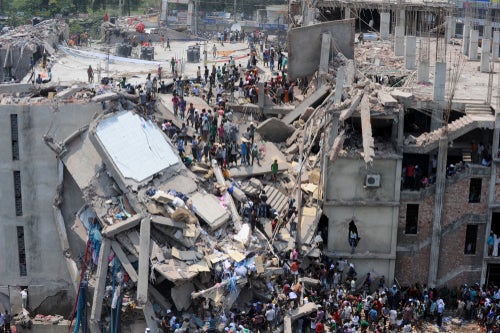
The Clean Clothes Campaign, which is an alliance of apparel labour unions and non-governmental organisations, claims fashion brands including Levi Strauss, Gap, Target and VF Corp (The North Face) that have not yet signed the international health and safety accord that was introduced after the Rana Plaza factory tragedy are now benefitting from the improvements made to factory practices.
The Clean Clothes Campaign explains the Rana Plaza building collapse exposed the unsafe labour conditions for factory workers in the apparel sector. It adds that today “the struggle for safe factories continues, as some major garment and textile brands still continue to refuse to put their workers’ safety first”.
The Clean Clothes Campaign suggests the fashion brands who have refused to sign the health and safety accord for the garment and textile sector are “freeriding” on the efforts of the 171 brands who have signed the agreement.
The alliance states: “171 brands sourcing from Bangladesh have signed this agreement, including fast fashion giants like H&M, Inditex (Zara), and Fast Retailing (Uniqlo). By refusing to join and pay into the programme, but still sourcing from the factories that are being improved by this programme, Levi Strauss and IKEA are freeriding on the efforts of these other brands. Our research into these factories shows how both brands have been profiting from progress made possible by the programme that they have failed to support both financially and politically.”
The Clean Clothes Campaign has published a list of brands that are yet to sign the health and safety accord, however the organisation singles out Levi’s in its new research as a fashion brand that has benefitted from the improvements of the programme despite “refusing” to join.
The Clean Clothes Campaign says: “In one of the factories where Levi Strauss has been sourcing from since 2011, engineers noted corrosion in columns upholding the multi-storey building and found the electrical systems of the factory to be in a dismal state without proof of regular inspections. All these items were remediated in the three years after, without the brand contributing to the programme that enabled this progress.”

US Tariffs are shifting - will you react or anticipate?
Don’t let policy changes catch you off guard. Stay proactive with real-time data and expert analysis.
By GlobalDataIt also states that according to Levi Strauss’ latest factory list from the first quarter of 2022, the company has 21 supplier factories in Bangladesh despite not signing the previous Accords of 2013 and 2018, and adds: “Our research shows that even after years of sourcing by Levi Strauss, its supplier factories scored very poorly on many safety indicators.”
Levi Strauss, Gap and Target had not replied to Just Style’s request for comment prior to publication.
In an official statement VF Corp tells Just Style: “At VF, protecting all workers from workplace hazards has always been, and remains, a central focus of our global operations. We diligently assess all factories across the VF supply chain for safety risks, using both internal auditors and external experts, and support our supply chain partners with improvements if safety deficiencies are found.”
The company adds: “Our dedicated focus on workplace safety continues to evolve and includes international safety standards adopted from leading countries. In order to supply products to VF, we require all of our supply chain partners globally to comply with the same set of safety standards. The performance against VF’s safety requirements is verified by VF experts on a regular basis.”
VF Corp also explains that in order to reduce duplication and uphold high levels of performance, it is a founding member of Nirapon, which it adds is a safety monitoring organisation that provides assurances to international brands that the factories supplying product from Bangladesh meet the brands’ standards.
In June 2020, Nirapon announced it was exiting Bangladesh to operate from North America.
VF Corp says: “We believe Nirapon and the safety monitoring it conducts are crucial components to factory safety. Since Nirapon was founded there have been zero deaths from fire incidents, structural malfunctions or electrical accidents at VF factories.”
The Clean Clothes Campaign argues however that crucial safety work can only continue if all brands sourcing from Bangladesh sign the health and safety accord as soon as possible.
It says it’s call goes out specifically to brands who failed to sign the International Accord even though they were a buyer at one of the Rana Plaza factories in 2013. It explains the factories these brands source from continue to have many of the same safety risks that were prevalent in the industry before Rana Plaza.
General Secretary of Akota Garments Worker Federation (AGWF), Md. Kamrul Hassan adds: “Workers need to be sure that they are not risking their lives when they go to work. This is a basic right. Only a system where unions are part of the solution can bring change to the garment industry. All brands that source from Bangladesh must sign the International Accord now if they care about their workers’ safety.”
The Clean Clothes Campaign says: “We urge all stakeholders to ensure the Accord’s work can be carried out as intended, to ensure workers can feel safe in the workplace.”
The organisation concludes: “It is time that brands stop hiding behind the efforts of their competitors and behind their own weak go-it-alone programmes and, once and for all, start taking real responsibility to meaningfully and credibly work towards preventing the next building collapse or fire.”



